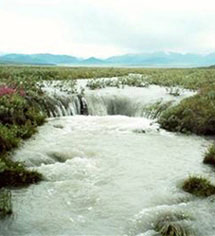 |
 |
 |
 Editorials | Environmental | March 2005 Editorials | Environmental | March 2005  
US Senate Votes to Allow Arctic Drilling
 H. Josef Hebert - The Associated Press H. Josef Hebert - The Associated Press


| This part of the Arctic National Wildlife Refuge lies within the area along the coastal plain where oil drilling is being considered. (Photo: U.S. Fish & Wildlife Service)

|
Washington - Amid the backdrop of soaring oil and gasoline prices, a sharply divided US Senate on Wednesday voted to open the ecologically rich Alaska wildlife refuge to oil drilling, delivering a major energy policy win for President Bush.

The Senate, by a 51-49 vote, rejected an attempt by Democrats and GOP moderates to remove a refuge drilling provision from next year's budget, preventing opponents from using a filibuster - a tactic that has blocked repeated past attempts to open the Alaska refuge to oil companies.

The action, assuming Congress agrees on a budget, clears the way for approving drilling in the refuge later this year, drilling supporters said.

The oil industry has sought for more than two decades to get access to what is believed to be billions of barrels of oil beneath the 1.5 million-acre coastal plain of the Arctic National Wildlife Refuge in the northern eastern corner of Alaska.

Environmentalists have fought such development and argued that despite improve environmental controls a web of pipelines and drilling platforms would harm calving caribou, polar bears and millions of migratory birds that use the coastal plain.

Bush has called tapping the reserve's oil a critical part of the nation's energy security and a way to reduce America's reliance on imported oil, which account for more than half of the 20 million barrels of crude use daily. The Alaska refuge could supply as much as 1 million barrels day at peak production, drilling supporters said.

"We won't see this oil for 10 years. It will have minimal impact," argued Sen. Maria Cantwell, D-Wash., a co-sponsor of the amendment that would have stripped the arctic refuge provision from the budget document. It is "foolish to say oil development and a wildlife refuge can coexist," she said.

Sen. John Kerry, D-Mass., argued that more oil would be saved if Congress enacted an energy policy focusing on conservation, more efficient cars and trucks and increased reliance on renewable fuels and expanded oil development in the deep-water Gulf where there are significant reserves.

"The fact is (drilling in ANWR) is going to be destructive," said Kerry.

But drilling proponents argued that modern drilling technology can safeguard the refuge and still tap the likely - though not yet certain - 10.4 billion barrels of crude in the refuge.

"Some people say we ought to conserve more. They say we ought to conserve instead of producing this oil," said Sen. Pete Domenici, R-N.M., "But we need to do everything. We have to conserve and produce where we can."

The vote Wednesday contrasted with the last time the Senate took up the ANWR drilling issue two years ago. Then, an attempt to include it in the budget was defeated. But drilling supporters gained strength last November when Republicans picked up three additional seats, all senators who favored drilling in the refuge.

Opponents of drilling complained that Republicans this time were trying "an end run" by attaching the refuge provisions to the budget, a tactic that would allow the measure to pass with a majority vote.

"It's the only way around a filibuster" which requires 60 votes to overcome, countered Stevens.

The 19-million-acre refuge was set aside for protection by President Eisenhower in 1960, but Congress in 1980 said its 1.5 million acre coastal plain could be opened to oil development if Congress specifically authorizes it.

Bush, who has urged Congress repeatedly to allow oil companies to tap the refuge's crude, said Wednesday it's "a way to get some additional reserves here at home on the books." | 
 | |
 |



